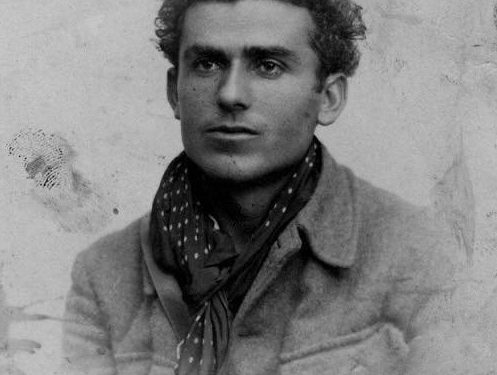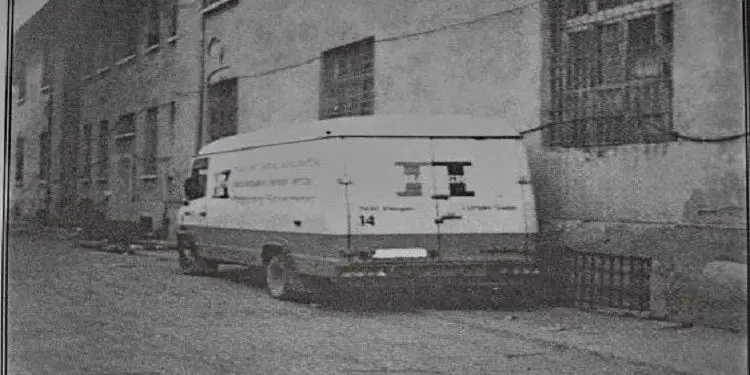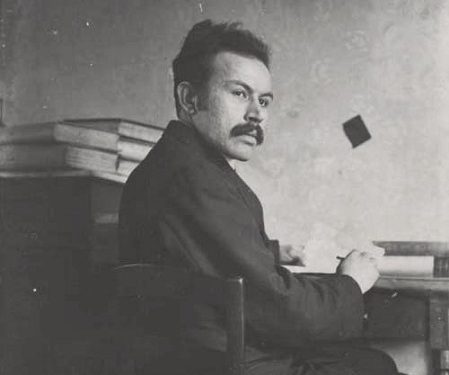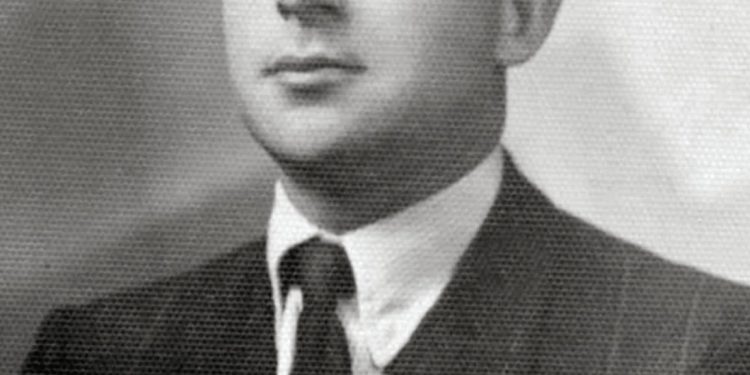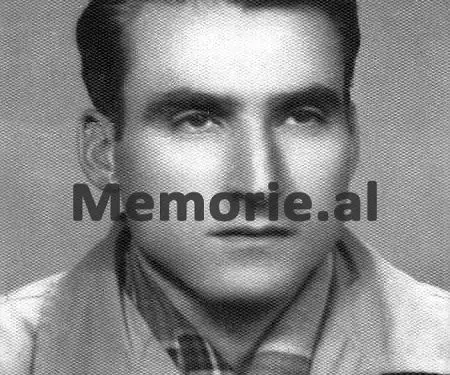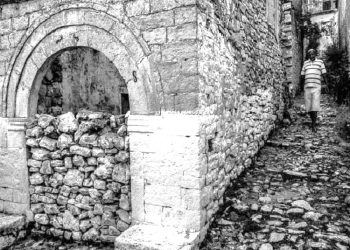The third part
Memorie.al / Confessions of the well-known writer Petro Marko, former fighter of the Internationalist Brigades in the War of Spain and Tirana, tell the behind-the-scenes of what is known as the Anti-Fascist National Liberation War and why Koçi Xoxe hated Enver Hoxha?! Sejfulla Maleshova’s order: “This is a terrorist party; don’t open your mouth, because you will suffer…”! Why was Petro Marko sentenced and who were those who prepared his arrest and who helped him after leaving prison, etc. Selected parts from the book “Interview with myself”, by the well-known Albanian writer Petro Marko, published in the early 90s after the collapse of the communist regime, a book which had a great echo in the press of the time, after it was published and reprinted several times, and setting a sales record.
-THE CALVARY STARTS-
I don’t want to write these notes like Silvio Peliko: “Le mie prixhioni – My prisons;” or like Antonio Gramshi: “Lettere ali intellectuali italiani”; or like Marco Polo’s “Il milione”…! I want to wander with my memories in those “trenches” where fantasy was the only weapon of life and night was the sister of freedom. I knew this prison from the time of Zog, but then there were fewer politicians, most of them were ordinary. The truth was that at that time, political prisoners, as Haki Stërmilli has written several parts in his novel “Prison”, could have their mother or wife or sister come to the dungeon and serve sometimes. During the Italian occupation, the prison became a revolutionary school. There we had the collective; we ate together, studied together and took political courses.
I was in Dhërmi prison, just one night, then in Vlora prison, because I had made a tract (the first anti-Italian tract)…! Then in the prison of Fier, in the prison of Tirana, in the prison of Brindisi, in the prison of Bari, in the prison of Palermo, in the “Rexhina Çeli” prison in Rome…! I was a man who grew up with the dreams that prisoners have when they are young, and at any cost, they don’t want to kill their dreams, they are keeping them alive, the beautiful dreams, of freedom, of love, of traveling the world of wonders, they are the force that keeps alive those who have an ideal, those who believe and hope that the world is guided by humanity, democracy, freedom, brotherhood…
Question: – Was there, in that prison life, any spark, however small, of making dreams come true?
Answer: – I remember an unforgettable moment. Officer Maqo Pecani, a good man (because there were officers with a human heart), allowed my Safoja to look at me through two pairs of bars on the second floor. They told me to go to the bars. Beyond I saw my dream, my Sappho, with whom I lived there day and night, even in the most inhuman tortures. Surprisingly, it seems that her love, her chaste spirit, has greatly influenced my unbreakable attitude…!
She had the light from behind; I had the light in front…! When he saw me, he burst into tears and uttered with a sigh: “How did you make him look like this…”! Only my teeth were visible! Cry. I calmed him down by telling him that; soon this ordeal of ours would end…! The young, beautiful girl, who knew how many powerful people, had told her: “Leave her, because you will also lose”, – she was silent and patient, she was waiting for me…! That day was an apocalypse for me! I will never forget it. It was a ray of hope, after all those months, those three years of deep isolation, that bloody terror. No one was allowed to meet his family.
One day, Koço Boshnjaku called me to the translation office and read me two poems by the poet Zoshenko, who was severely condemned by Zhdanov. The first had this content: “The monkeys decided to make an original state. They built a very big cage, where everyone was put inside, except for the leadership, who had to stay outside the cage”! For this and for “Eugene Onegin in Petersburg”, the theme of which was this: “Eugene Onegin, Pushkin’s character, was resurrected and went to Petersburg, which was now called Leningrad. He boarded the tram holding the bag in his hand. They pushed him, especially the fat women, who smelled of garlic and farts and who made fun of him…!
He lost it, because he remembered the old women of Petersburg, elegant and noble, and forgot to get off at the station where he was supposed to get off. He got off at a further station, while being pushed and insulted as a dangerous bourgeois…! When he got off, Onegin no longer had the bag in his hand. They had taken He went to the station police office and complained that his bag had been taken. And, as he spoke, he took the pencil from the table and waved it.
The officer told him: “You had the bag in your hand and they took it.” Where can we find the one who took it?! Onegini told him: “It is good to make a law, to cut off the hands of those who steal”! And the officer, laughing, told him: “The pencil you took is amazing, because I have it in the inventory…! Well, what do you say, crazy boy! If we cut off the hands of those who steal, today the Russian people would be without hands…! But give me the pencil, because you too have to have your hand cut off”! Zhdanov expelled this Zoshenko and the poetess Ahmanova from the League of Writers.
We had created a good circle of friends, like; Mirash Ivanaji, Mitrush Kuteli, Arshi Pipa…! I have to open a parenthesis, because I mentioned Arshi Pipa. I heard many years ago, from Radio Vatikani (Albania), Arshiu’s poem “Vloçishti”. That Arshiu had been in Vloçisht (of Maliqi), together with Nexhmi Ballka and others, to dry Maliqi’s swamp… Infernal! Real hell! The prisoners drowned in the mud and the guards pushed them deeper, so they wouldn’t come out! There have been camps in Russia and elsewhere, but like Vloçishti, there will not have been in any country! Whoever is still alive and has been to the drying up of the Maliq swamp, I believe that he can never forget those macabre scenes…!
Political prisoners have worked for the construction of many works, such as the Ballsh Refinery, the infamous Spaçi, Bulqiza mines and elsewhere…! And the ordinary prisoners worked on the famous terraces of Lukova, Ksamil and many other farms! They also worked on the construction of houses in Tirana and in the districts. These laborious works have tormented thousands and thousands of boys and men, who in the heat and in the rain and snow, worked outside as slaves of antiquity. Behind the scenes of “prosperous and happy Albania”, was the bitter truth: thousands and thousands of boys and girls, who worked hard in mines, opening terraces, opening roads, erecting bridges and buildings. Almost half of the Albanian people experienced this.
CONVERSATIONS, EPISODES, CHARACTERS
These questions were asked, these conversations:
Why should political convicts be together with ordinary convicts?
Why should the convicts, who used to be with the Party, but are now convicted for agitation and propaganda, be with their enemies during the War, such as the Ballistët, those of “Legality” and others?
There were those who erased twenty years from the calendar – from 1924 to 1944. Until 1924, they were with Fan Noli, with the “Union”, then after 1924, they were with Zogu, with Italy fascist, with Nazi Germany. They boasted that they had been with Fan Noli and, with the “Union”, but they never mentioned Zogu or the occupiers. With stunts, they hung the decorations of democracy on their chests, which disappeared from Zogu in 1924, and did not mention the benefits they had from Mussolini or Hitler.
Branko Merxhani called these types “Gangs of history”. However, they also benefited a lot from this regime, because they were trained in the profession of gang, servile, servant of the great. And the government helped them, because it knew that they could not open their mouths about the injustices that were being done, that they themselves were the offspring of injustice and immorality.
– As it seems, – Koço Boshnjaku told us, in a low voice, there in a corner of the prison corridor, – all the rulers follow the same path in valuing and supporting the people…!
Episode: Downstairs, in the dungeons, the investigation into those who added to the ranks of the prisoners continued. It sometimes happened that an arrested person, while being questioned by the investigators, mentioned a name of a fellow convict who was upstairs on our floor. At night, the police came, took the convict and took him downstairs to the interrogation room. Anyone whose name came up, to be called back to the inquisitor, was terrified that who knows what other complications he would have, who would be subjected to torture and could be punished more, maybe even by death – things that had happened
There, in the interpreters’ room, was Professor Filip Fishta, a rotund Jesuit, dressed in a white shirt, long as satin, from head to toe. If an international commission were to come from abroad to see the condition of the prisoners and show Philip, they would say that in Albania, the prisoners were fed so much that they became like Churchill. When Philip was called at night to go down to the investigator, his blood was cut off, he could barely walk. The two policemen held him by the arm, so that he wouldn’t jump down the stairs, things that happened to them several times. Philip’s lips turned white and he began to tremble when he entered the interrogation room, where two officers, one tall and the other short, held a hu in their hands. The one who was questioned and accused was lying in the square.
You don’t tell us, Mr. Professor (this tones somewhat softened Philip), you who deal with literature and linguistics…!
– Yes… yes… yes… – black Philip repeated.
– So, here with this friend, we are fighting over a word. (Philip’s eyes widened and he raised his ears more). We fight, because this friend here says that; the word single-mindedness means mentality…! How is work?
– Is that why you called me here?
– Yes! – said the tall investigator, who was holding a stick in his hand…!
Philip swallowed his saliva, lost consciousness and collapsed on the ground.
The investigators laughed and waited for him to come to his senses. He uttered with a broken voice:
– Excuse me while I take a breath…! – And they were told that their understanding was approaching.
– Ok, professor, now go! – said the taller one. And Philip came out bent and crushed. And the short investigator said:
– But what enemies of the people do we have?! I was raised for a simple question…! These will overthrow the government?!
Information: We learned everything that was done externally.
There were prisoners, who were informed about everything, that the prisoner has ears like a rabbit, listening to the rustling of leaves.
“Nako Spiru killed himself”!
Safoja announced this to me with the side of the famous cap.
Koço Boshnjaku, laughed to himself, that he knew Nako well, not only that he was from Durrës, they had worked together: Koço as the General Director of the State Bank and Nako as an economist (he had finished secondary studies in Commerce, at first in Corfu, then at university, for Economics in Turin). After liberation, they cooperated on economic issues. Kocoja thought a bit, rubbed his face…maybe even his wet eyes…and said in a wild tone: “Nakoja never kills himself…they killed him”!
He reasoned like this: When Nakoja had gone to Yugoslavia, for the unification of the currency, apparently he had not agreed with them…! They would have been very angry and would have said to our elder: “Why are you keeping him… who seeks to destroy our unity”?!
Unexpected and surprising events: They said that Tito was busy with Stalin and was going to be arrested in Moscow, just as many party secretaries were arrested and disappeared, but Dimitrov helped Tito and he escaped. He escaped. Upon reaching Belgrade, they said that Yugoslavia was excluded from the
Informbyroja and from the “Warsaw Treaty”. Here, Koçi Xoxe and his close associates of the Ministry were arrested. Koçi was sentenced to death. They say that, when he heard the claim and the decision of the president of the court, Bedri Spahiu, he said more or less the following: “Oh, black cat, black cat! As he now put you to punish me, so he will put another one to punish you”! And what was not said. They put us in prison, some collaborators of Kochi, whom no one approached. Koço Bosnjaku told us: What is their fault? It’s our fault too! That’s why we meet them…!
The other prisoners, with their attitude, openly showed their hatred and did not want to approach those who had been in charge of the Ministry of the Interior, which had arrested and sentenced them…!
I remembered a passage from Alexander Manzoni’s novel; “The Betrothed”. Encoja, the protagonist, went shopping. He had hung a flock of hens, upside down, and they poked out each other’s eyes: each one remembered that one had tied the other, that’s why it pecked. They – says the author – did not know which hand had tied them. And most of the convicts did not know which hand killed and imprisoned them! It was her. And the charge was the same: “agitation and propaganda or agents of the Anglo-Americans”.
A friend of Koci, sentenced to thirty years, told me that no arrest or execution was ever done without Enver’s order.
The First Party Congress was about to take place and everyone hoped to be released. Everyone was getting ready to go out, because there was talk of a general amnesty. Osman Gazepi, a man known for serious statements, as taken, but with meaning, sitting on the stairs, watching everyone getting ready to leave (that it was being insisted that the Congress would make this great apology, charging Koçi, as the butcher of this whole situation of punishments and executions), he said: “Oh shut the door, shut you! – They barely gathered us together here, and now they let us go…”!
A nominal amnesty was granted. I and some of my old friends like; Demiri, Koçoja and others did not forgive us, although we had spent three years in isolation.
In the atmosphere, the breakdown of relations with Tito was felt. It was said that now they were looking to strengthen ties with Stalin.
Many anti-Titoist Yugoslavs jumped here. They were imprisoned, but they did not want to talk to any Albanian officer. They were looking for a representative of the Soviet embassy in Tirana.
So now the portraits of Tito were removed from the offices and houses and those of Stalin were placed, next to that of Enver Hoxha.
Rare characters: One of these characters was Mirash Ivanaj, who, when he came from Turkey, I received and put him in the “Vollga” hotel. Then, the government appointed him to the library. He didn’t talk to anyone in prison. I approached him and he accepted from me, whatever I gave him. From others, he would not even accept a cigarette. He had come from Turkey (because he had run away with Zogu, since he had been the Minister of Education). He lived badly in Turkey. He decided to return, because he had worked all his life, as one of the most prominent erudites of our culture. He had left here many academic articles, for which he had worked all his life. He returned for them, but could not find them. The old lady who was guarding the house told him that during the inspection that was done; those from the Security did not leave any books. There were studies on the origin of the Albanian language; studies of the origins of our nation; studies of the Hellenic influence on our language and civilization; studies on the influence of Rome and Latin on our language; for the influence of the Turkish language, the Slavic language, on our language and culture. Ten complete studies – the work of a lifetime with the iron will of Mirash Ivanaj, for me one of the most cultured, among the most cultured, throughout our national history. Since he didn’t want to accept anything from anyone, I wrote to my Sappho, so that if possible, she would send him a small package a week, without her name. He wondered and said: “Who remembers me”?!
I used to sing sometimes. I had made a beautiful one, dedicated to my Sappho. I read it to him and he laughed, saying: “It seems that you are a poet, maybe you create and have handcuffs on my brain”!
Mirash Ivanaji, died in prison. I have a conscience and why, I will explain below.
I was convicted of a serious charge, without real facts! Why do you smoke American cigarettes? Why did you wear American military uniforms? These were the facts! And I, laughing, answered: “We had an agreement with the American allies to send us weapons, clothing and other things. Most of them dressed in American clothes, like the ones I wore. We even complained and said why they don’t send us more (because they were throwing them with parachutes). Most of our cadres had the same American clothes.” I was accused; why did I publish news on the front page of the “Bashkimi” newspaper, about UNRRA’s aid to our people and government. From these elements, their accusation resulted: Agent of the Anglo-Americans and of Fultz. An absurd, ridiculous, baseless, devastating accusation, even though I had done nothing wrong.
Now let me say my fault, for Mirash Ivanaj: When I came out, I should have gone to the Minister of Internal Affairs, who was then Mehmet Shehu, and told him that; Mirash Ivanaji, one of Albania’s most prominent intellectuals, was suffering. When I was about to leave the prison, I promised him that I would try to meet with Mehmet Shehu, and beg him: “Release Mirash Ivanaj. He only wants one thing: a place in the National Library, to work.
If you want, connect to the table…! He only wants to work”. – Here, I recognize this fault of mine as a serious fault that he would have worked in the Library and would have given to our culture, of course, if he had been released. So, the time came and on May 15, 1950, I was released after a military trial, quite formal, which sentenced me to three years of detention as an “enemy of the people”. (?!) Now, an even more complicated odyssey began. Memorie.al




